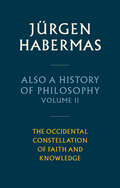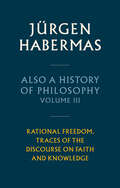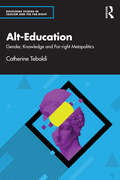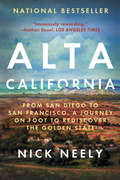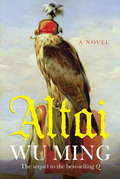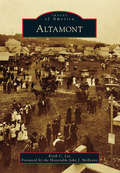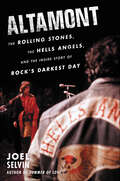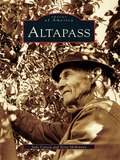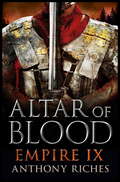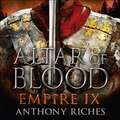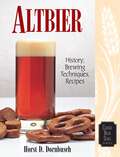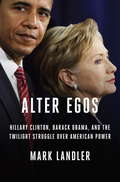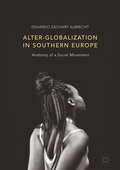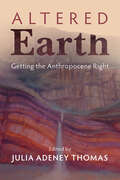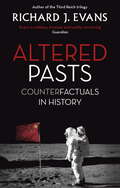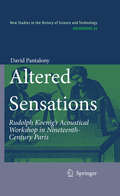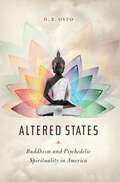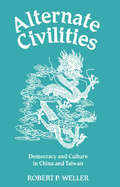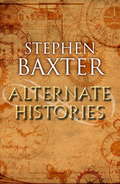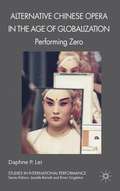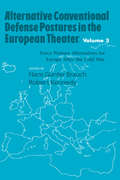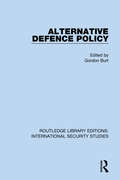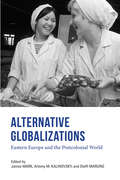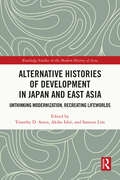- Table View
- List View
Also a History of Philosophy, Volume 2: The Occidental Constellation of Faith and Knowledge
by Jürgen HabermasIn this second volume of his groundbreaking new work on the history of philosophy, Jürgen Habermas traces the development of Western thought from the reception of Platonism by early Christian thought, through the revolution in medieval philosophy and theology triggered by the rediscovery of Aristotle’s works, up to the decoupling of philosophical and theological thought in nominalism and the Reformation that ushered in the postmetaphysical thinking of the modern age. In contrast to conventional histories that focus on movements and schools, Habermas takes the dialectic of faith and knowledge as a guiding thread for analysing key developments in the thought of major figures such as Augustine, Aquinas, Scotus, Ockham and Luther that constitute milestones in the genealogy of postmetaphysical thinking. A distinctive feature of Habermas’ approach is the prominence he accords practical philosophy, and in particular legal and political ideas, and the corresponding attention he pays to social, institutional and political history, especially as these bear on the relationship between church and state. As a result, the central preoccupations of Christian thought are shown to be original responses to questions raised by the Christian worldview that exploded the framework of Greek metaphysical thinking and remain crucial for the self-understanding of contemporary philosophy. Far from raising claims to exclusivity, completeness or closure, Habermas’s history of philosophy, published in English in three volumes, opens up new lines of research and reflection that will influence the humanities and social sciences for decades to come.
Also a History of Philosophy, Volume 3: Rational Freedom. Traces of the Discourse on Faith and Knowledge
by Jürgen HabermasIn the final volume of his history of philosophy, Jürgen Habermas offers a series of brilliant interpretations of the thinkers who set the agenda for contemporary philosophy. Beginning with masterful readings of Hume and Kant, he traces the genealogy of their postmetaphysical thinking through the main currents of historicism and German Idealism, and the multifarious reactions to Hegel’s influential system, culminating in nuanced readings of Marx, Kierkegaard and Peirce. Through his analysis of their work, Habermas demonstrates the interpretive fecundity of the central themes of his philosophical enterprise – his pragmatist theory of meaning, his communicative theories of subjectivity and sociality, and his discursive theory of normativity in its moral, juridical and political manifestations. In contrast to the bland compendia of thinkers and positions generally presented in surveys of the history of philosophy, Habermas’s thematically focused interpretations are destined to provoke controversy and stimulate dialogue. With this work one of the indisputably great thinkers of our time presents a powerful vindication of his conception of philosophy as an inherently discursive – and not merely analytical or speculative – enterprise.
Alt-Education: Gender, Knowledge and Far-right Metapolitics (Routledge Studies in Fascism and the Far Right)
by Catherine TebaldiAlt-Education looks at the stories the right tells about schools: a fight between an evil, indoctrinating government and a far-right freethinking truth warrior, between a frigid cultural Marxist teacher and a loving Christian mother.This book explores the link between education, gender, and far-right metapolitics, and offers insights into the ways in which it circulates and is normalized. Through digital ethnography and fieldwork it explores the production, circulation, and interpretation of these discourses and the ideologies they express, tracing their movement across four groups of women in the US and UK – fascists, white nationalist, Christian nationalists, and Republicans. Although often understood to be opposed to education, the far-right is instead opposed to schooling – and offers its own practices of alt-education. Through media, alternative schools and home education, the far-right teaches their ideologies of gender and race, knowledge, and power, as well as transmitting alternative histories, sociologies, and conspiracies. From mom’s groups to digital discourses about the evils of public schools, social media are key arenas in which women not only teach, but are taught, far-right alternative knowledge. Alt-education teaches reactionary ideology as a timeless truth, normalizing it through discourses of home, family and love. At the same time, alt-education borrows and co-opts the language of critique – normalizing racism, sexism and fascism a kind of alternative knowledge, while making it exciting as a countercultural critique of “woke” liberal indoctrination. The book concludes with a look at this attempt to “speak post-truth to power” as a way of normalizing and spreading their ideology – bringing alt-education to a wide audience as their critiques of “woke” politics spreads across the US, UK, and into Europe.This book is aimed at scholars of the far-right and gender, as well as scholars and practitioners of education. Written in an accessible and engaging tone, this book will be of interest to both researchers and advanced undergraduates.
Alta California: From San Diego to San Francisco, A Journey on Foot to Rediscover the Golden State
by Nick NeelyThis national bestseller chronicles one man’s 650–mile trek on foot from San Diego to San Francisco—sure to appeal to readers of naturalist works like Edward Abbey’s Desert Solitaire, Paul Thoreau’s On the Plain of Snakes, and Mark Kenyon’s That Wild Country.In 1769, an expedition led by Gaspar de Portolá sketched a route that would become, in part, the famous El Camino Real. It laid the foundation for the Golden State we know today, a place that remains as mythical and captivating as any in the world.Despite having grown up in California, Nick Neely realized how little he knew about its history. So he set off to learn it bodily, with just a backpack and a tent, trekking through stretches of California both lonely and urban. For twelve weeks, following the journal of expedition missionary Father Juan Crespí, Neely kept pace with the ghosts of the Portolá expedition—nearly 250 years later.Weaving natural and human history, Alta California relives Neely’s adventure, while telling a story of Native cultures and the Spanish missions that soon devastated them, and exploring the evolution of California and its landscape. The result is a collage of historical and contemporary California, of lyricism and pedestrian serendipity, and of the biggest issues facing California today—water, agriculture, oil and gas, immigration, and development—all of it one step at a time.“Rich in little–known history . . . Up the Santa Barbara and San Luis Obispo county coasts, then inland into the Salinas Valley to Monterey Bay. Somewhere along here, the owl moons and woodpeckers do something you might not have thought possible in 2019: they make you fall, or refall, in love with California, ungrudgingly, wildfires and insane housing prices and all . . . What a journey, you think. What a state." —San Francisco Chronicle
Altai
by Shaun Whiteside Wu Ming1569. When a fire breaks out in the Arsenal of venice, everyone suspects Joseph Nasi, number-one enemy of the republic. But it is Emmanuele De Zante, spy catcher and agent, who finds himself in jail accused of treason, having been betrayed by his lover. But who really is De Zante?With an epic, panoramic sweep that reaches across a Europe scarred by war, Altai is a thrilling tale and a coruscating portrait of the divided world in the sixteenth century where the great powers of the Republic of venice and the Ottomans threatened a clash of empires. Through this dramatic landscape, Wu Ming create a powerful narrative of danger, identity and adventure.
Altamont
by Keith C. Lee Honorable John McenenyLocated on the western edge of the sprawling Van Rensselaer patent, the village of Altamont was originally called Knowersville. It first gained prominence as a stopping-off place for early travelers struggling along trails from the Hudson River to the Schoharie Valley. As time passed, roads improved and commerce grew. Once the railroad arrived in 1863, the trip from Albany took just 45 minutes, and travelers quickly embraced the beauty of the Helderberg escarpment. A commercial center, including hotels, shops, and small manufacturers, grew quickly around the new train station, and well-to-do Albanians seeking respite from city heat bought property for summer mansions on the hillside above the village. The Altamont Fair supported local agriculture and brought in visitors from around the world. Altamont reveals the beginnings of this little village under the Helderbergs.
Altamont: The Rolling Stones, the Hells Angels, and the Inside Story of Rock's Darkest Day
by Joel SelvinIn this breathtaking cultural history filled with exclusive, never-before-revealed details, celebrated rock journalist Joel Selvin tells the definitive story of the Rolling Stones’ infamous Altamont concert, the disastrous historic event that marked the end of the idealistic 1960s.In the annals of rock history, the Altamont Speedway Free Festival on December 6, 1969, has long been seen as the distorted twin of Woodstock—the day that shattered the Sixties’ promise of peace and love when a concertgoer was killed by a member of the Hells Angels, the notorious biker club acting as security. While most people know of the events from the film Gimme Shelter, the whole story has remained buried in varied accounts, rumor, and myth—until now.Altamont explores rock’s darkest day, a fiasco that began well before the climactic death of Meredith Hunter and continued beyond that infamous December night. Joel Selvin probes every aspect of the show—from the Stones’ hastily planned tour preceding the concert to the bad acid that swept through the audience to other deaths that also occurred that evening—to capture the full scope of the tragedy and its aftermath. He also provides an in-depth look at the Grateful Dead’s role in the events leading to Altamont, examining the band’s behind-the-scenes presence in both arranging the show and hiring the Hells Angels as security.The product of twenty years of exhaustive research and dozens of interviews with many key players, including medical staff, Hells Angels members, the stage crew, and the musicians who were there, and featuring sixteen pages of color photos, Altamont is the ultimate account of the final event in rock’s formative and most turbulent decade.
Altapass (Images of America)
by Judy Carson Terry MckinneyThe region that is now Altapass was settled in the last third of the 18th century by restless and brave souls of Scot-Irish descent. The most colorful and prolific of these was CharlieMcKinney, a man set upon making a life for himself, his 4 wives, and his 48 children in the Appalachian wilderness. His children intermarried with many families, including the Davenports, Biddixes, Halls, and Wisemans, to establish a community that has survived and thrived in this rugged paradise. Change has often come to the community in sudden bursts, including the arrival of the railroad a century ago, which gave the community its life, name, and most enduring institution, the Orchard at Altapass.
Altar of Blood: Empire IX (Empire series #9)
by Anthony Riches'A master of the genre' The TimesThe Tungrians have no sooner returned to Rome than they find themselves tasked with a very different mission to their desperate exploits in Parthia. Ordered to cross the river Rhenus into barbarian Germany and capture a tribal priestess who may be the most dangerous person on the empire's northern border, they are soon subject to the machinations of an old enemy who will stop at nothing to sabotage their plans before they have even set foot on the river's eastern bank. But after their Roman enemy is neutralised they face a challenge greater still. With two of the Bructeri tribe's greatest treasures in their hands they must regain Roman territory by crossing the unforgiving wilderness that was the graveyard of Roman imperial strategy two hundred years before. And capture by the Bructeri's vengeful chieftain and his warband can only end in one way - a horrific sacrificial death on the tribe's altar of blood.
Altar of Blood: Empire IX (Empire series #9)
by Anthony Riches'A master of the genre' The TimesThe ninth novel in the thrilling Empire sequence leads Centurion Marcus Aquila and the Tungrians to the battlefield that was one of Rome's most disastrous defeats.The Tungrians have no sooner returned to Rome than they find themselves tasked with a very different mission to their desperate exploits in Parthia. Ordered to cross the river Rhenus into barbarian Germany and capture a tribal priestess who may be the most dangerous person on the empire's northern border, they are soon subject to the machinations of an old enemy who will stop at nothing to sabotage their plans before they have even set foot on the river's eastern bank. But after their Roman enemy is neutralised they face a challenge greater still. With two of the Bructeri tribe's greatest treasures in their hands they must regain Roman territory by crossing the unforgiving wilderness that was the graveyard of Roman imperial strategy two hundred years before. And capture by the Bructeri's vengeful chieftain and his warband can only end in one way - a horrific sacrificial death on the tribe's altar of blood.(P)2016 Hodder & Stoughton
Altar of Blood: Empire Ix Ebook
by Anthony Riches'A master of the genre' The TimesThe ninth novel in the thrilling Empire sequence leads Centurion Marcus Aquila and the Tungrians to the battlefield that was one of Rome's most disastrous defeats.The Tungrians have no sooner returned to Rome than they find themselves tasked with a very different mission to their desperate exploits in Parthia. Ordered to cross the river Rhenus into barbarian Germany and capture a tribal priestess who may be the most dangerous person on the empire's northern border, they are soon subject to the machinations of an old enemy who will stop at nothing to sabotage their plans before they have even set foot on the river's eastern bank. But after their Roman enemy is neutralised they face a challenge greater still. With two of the Bructeri tribe's greatest treasures in their hands they must regain Roman territory by crossing the unforgiving wilderness that was the graveyard of Roman imperial strategy two hundred years before. And capture by the Bructeri's vengeful chieftain and his warband can only end in one way - a horrific sacrificial death on the tribe's altar of blood.
Altbier: History, Brewing Techniques, Recipes
by Horst D. DornbuschBrewed centuries ago by monks and nuns, this copper-colored, full-bodied ale has a proud and unbroken brewing tradition dating back to the beginning of civilization. Horst Dornbusch sheds light on the practices of commercial altbier makers, how the equipment and ingredients used affect its flavor, and how this full-bodied brew became one of Germany's most beloved beer styles. Recipes are included!Brewers Publications' Classic Beer Style Series is devoted to offering in-depth information on world-class beer styles by exploring their history, flavor profiles, brewing methods, recipes, and ingredients.
Alter Egos: Hillary Clinton, Barack Obama, and the Twilight Struggle Over American Power
by Mark LandlerThe deeply reported story of two supremely ambitious figures, Barack Obama and Hillary Clinton--archrivals who became partners for a time, trailblazers who share a common sense of their historic destiny but hold very different beliefs about how to project American power In Alter Egos, veteran New York Times White House correspondent Mark Landler takes us inside the fraught and fascinating relationship between Barack Obama and Hillary Clinton--a relationship that has framed the nation's great debates over war and peace for the past eight years.In the annals of American statecraft, theirs was a most unlikely alliance. Clinton, daughter of an anticommunist father, was raised in the Republican suburbs of Chicago in the aftermath of World War II, nourishing an unshakable belief in the United States as a force for good in distant lands. Obama, an itinerant child of the 1970s, was raised by a single mother in Indonesia and Hawaii, suspended between worlds and a witness to the less savory side of Uncle Sam's influence abroad. Clinton and Obama would later come to embody competing visions of America's role in the world: his, restrained, inward-looking, painfully aware of limits; hers, hard-edged, pragmatic, unabashedly old-fashioned. Spanning the arc of Obama's two terms, Alter Egos goes beyond the speeches and press conferences to the Oval Office huddles and South Lawn strolls, where Obama and Clinton pressed their views. It follows their evolution from bitter rivals to wary partners, and then to something resembling rivals again, as Clinton defined herself anew and distanced herself from her old boss. In the process, it counters the narrative that, during her years as secretary of state, there was no daylight between them, that the wounds of the 2008 campaign had been entirely healed. The president and his chief diplomat parted company over some of the biggest issues of the day: how quickly to wind down the wars in Iraq and Afghanistan; whether to arm the rebels in Syria; how to respond to the upheaval in Egypt; and whether to trust the Russians. In Landler's gripping account, we venture inside the Situation Room during the raid on Osama bin Laden's compound, watch Obama and Clinton work in tandem to salvage a conference on climate change in Copenhagen, and uncover the secret history of their nuclear diplomacy with Iran--a story with a host of fresh disclosures. With the grand sweep of history and the pointillist detail of an account based on insider access--the book draws on exclusive interviews with more than one hundred senior administration officials, foreign diplomats, and friends of Obama and Clinton--Mark Landler offers the definitive account of a complex, profoundly important relationship. As Barack Obama prepares to relinquish the presidency, and Hillary Clinton makes perhaps her last bid for it, how both regard American power is a central question of our time. Advance praise for Alter Egos "A superb journalist has brought us a vivid, page-turning, and revelatory account of the relationship between Barack Obama and Hillary Clinton, as well as of their statecraft. Alter Egos will make a signal contribution to the national debate over who should be the next American president."--Michael Beschloss, bestselling author of Presidential Courage "Mark Landler, one of the best reporters working in Washington today, delivers an inside account of Hillary Clinton's relationship with Barack Obama that brims with insight and high-level intrigue. It's both fun to read and eye-opening."--Jane Mayer, bestselling author of Dark Money: The Hidden History of the Billionaires Behind the Rise of the Radical RightFrom the Hardcover edition.
Alter-globalization in Southern Europe: Anatomy of a Social Movement
by Eduardo Zachary AlbrechtConsidering the rise of global political instability and subsequent importance of new social movements, this cutting edge book examines the relationship between the alter-globalization movement and political power in Italy, Spain, and Greece. It argues that not only is the movement anti-political, but that it operates within an apolitical social milieu, as a ritualized holding pattern for middle class youths that find themselves uncomfortably placed between a receding state structure on the one hand, and a rising informal economy on the other. Its ritual liminality allows adherents to act revolutionary while assuring that their middle class privileges remain intact. The author considers the social ramifications of the movement at a time when Europe finds itself at a political and economic crossroads, and offers specific and timely case studies from the three southern European countries.
Altered Earth: Getting the Anthropocene Right
by Julia Adeney ThomasAltered Earth aims to get the Anthropocene right in three senses. With essays by leading scientists, it highlights the growing consensus that our planet entered a dangerous new state in the mid-twentieth century. Second, it gets the Anthropocene right in human terms, bringing together a range of leading authors to explore, in fiction and non-fiction, our deep past, global conquest, inequality, nuclear disasters, and space travel. Finally, this landmark collection presents what hope might look like in this seemingly hopeless situation, proposing new political forms and mutualistic cities. 'Right' in this book means being as accurate as possible in describing the physical phenomenon of the Anthropocene; as balanced as possible in weighing the complex human developments, some willed and some unintended, that led to this predicament; and as just as possible in envisioning potential futures.
Altered Pasts: Counterfactuals in History
by Sir Richard J. Evans FBA, FRSL, FRHisA bullet misses its target in Sarajevo, a would-be Austrian painter gets into the Viennese academy, Lord Halifax becomes British prime minister in 1940: seemingly minor twists of fate on which world-shaking events might have hinged.Alternative history has long been the stuff of parlour games, war-gaming and science fiction, but over the past few decades it has become a popular stomping ground for serious historians. Richard J. Evans now turns a critical, slightly jaundiced eye on the subject. Altered Pasts examines the intellectual fallout from historical counterfactuals. Most importantly, Evans takes counterfactual history seriously, looking at the insights, pitfalls and intellectual implications of changing one thread in the weave of history.
Altered Sensations: Rudolph Koenig’s Acoustical Workshop in Nineteenth-Century Paris (Archimedes #24)
by David PantalonyRudolph Koenig was one of the more prolific and colourful instrument makers in the renowned nineteenth-century precision instrument trade of Paris. Beginning his career as a violin maker, in 1858 the young Prussian immigrant shifted his talents towards the growing field of acoustics. Altered Sensations is a portrait of his vibrant atelier, a place of construction, commerce and experiment. For over forty years it was also a popular meeting place for scientists, artisans, musicians and teachers. Using archival and collection research from across North American and Europe, David Pantalony has traced the material and social influences of this space on the development of modern acoustics. In particular, he has detailed the manner in which Koenig modified, extended, spread and challenged Hermann von Helmholtz's Sensations of Tone. A large part of the research on Koenig comes from the actual products of his workshop which survive in museums and collections around the world. The second section of Altered Sensations provides a Catalogue Raisonné of Koenig's entire line of instruments, including their history, details from specific examples, locations, and references in the literature. This catalogue will serve as a practical guide for curators and researchers as well as a comprehensive overview of nineteenth-century acoustical practice.
Altered States: Buddhism and Psychedelic Spirituality in America
by Douglas OstoIn the 1960s, Americans combined psychedelics with Buddhist meditation to achieve direct experience through altered states of consciousness. As some practitioners became more committed to Buddhism, they abandoned the use of psychedelics in favor of stricter mental discipline, but others carried on with the experiment, advancing a fascinating alchemy called psychedelic Buddhism. Many think exploration with psychedelics in Buddhism faded with the revolutionary spirit of the sixties, but the underground practice has evolved into a brand of religiosity as eclectic and challenging as the era that created it. <P><P>Altered States combines interviews with well-known figures in American Buddhism and psychedelic spirituality—including Lama Surya Das, Erik Davis, Geoffrey Shugen Arnold Sensei, Rick Strassman, and Charles Tart—and personal stories of everyday practitioners to define a distinctly American religious phenomenon. The nuanced perspective that emerges, grounded in a detailed history of psychedelic religious experience, adds critical depth to debates over the controlled use of psychedelics and drug-induced mysticism. The book also opens new paths of inquiry into such issues as re-enchantment, the limits of rationality, the biochemical and psychosocial basis of altered states of consciousness, and the nature of subjectivity.
Alternate Civilities: Democracy and Culture in China and Taiwan
by Robert P. WellerSome Asian political leaders and Western academics have recently claimed that China is unlikely to produce an open political system. This claim rests on the idea that ?Confucian cultureOCO provides an alternative to Western civil values, and that China lacked the democratic traditions and even the horizontal institutions of trust that could build a civil society. An opposed school of thought is far more optimistic about democracy, because it sees market economies of the kind China has begun to foster as pushing inexorably against authoritarian political control and reproducing Western patterns of change. "Alternate Civilities" argues for a different set of political possibilities. By comparing China with TaiwanOCOs new and vibrant democracy, it shows how democracy can grow out of Chinese cultural roots and authoritarian institutions. The business organizations, religious groups, environmental movements, and womenOCOs networks it examines do not simply reproduce Western values and institutions. These cases point to the possibility of an alternate civility, neither the stubborn remnant of an ancient authoritarian culture, nor a reflex of market economics. They are instead the active creation of new solutions to the problems of modern life. "
Alternate Histories
by Stephen BaxterHere, collected for the first time in eBook form, are seven of Stephen Baxter's most remarkable and enjoyable novels, all dealing with alternate histories.In the TIME'S TAPESTRY series - containing the novels EMPEROR, CONQUEROR, NAVIGATOR and WEAVER - we see a series of different versions of our own world's history, constantly changing and being altered. Covering the time from the Roman occupation of Britain through to the German invasion of 1940, this series explains why our history is the way it is, and what might have happened differently.In the NORTHLAND trilogy (STONE SPRING, BRONZE SUMMER, IRON WINTER), Baxter explores an alternative creation of the British landscape, following a stone-age tribe from the now-flooded land-bridge that once connected Great Britain and Europe. In their frantic attempts to hold back the rising seas, the people of Northland will discover new techniques and technologies - discoveries that will change the course of human civilisation.
Alternative Chinese Opera in the Age of Globalization
by Daphne P. LeiBringing the study of Chinese theatre into the 21st-century, Lei discusses ways in which traditional art can survive and thrive in the age of modernization and globalization. Building on her previous work, this new book focuses on various forms of Chinese 'opera' in locations around the Pacific Rim, including Hong Kong, Taiwan and California.
Alternative Conventional Defense Postures In The European Theater: Military Alternatives for Europe after the Cold War (Alternative Conventional Defense Postures In The European Theater Ser.)
by Robert Kennedy Hans Günter BrauchFirst published in 1993. Routledge is an imprint of Taylor & Francis, an informa company.
Alternative Defence Policy (Routledge Library Editions: International Security Studies #1)
by Gordon BurtThis book, first published in 1988, represents a unique attempt to combine a discussion of an alternative British defence policy in terms of military strategy and new technology, with a consideration of how this policy might be secure in political terms. Written against a background of a possible future Labour government in the late 1980s with a radically different defence policy to the Conservative Government of the day, it considers questions such as: Would conventional deterrence really be effective? Just what is the Labour Party’s defence policy? How precisely might Britain be transformed into a non-aligned, non-militarist state?
Alternative Globalizations: Eastern Europe and the Postcolonial World
by James Mark Artemy M. Kalinovsky Steffi MarungGlobalization has become synonymous with the seemingly unfettered spread of capitalist multinationals, but this focus on the West and western economies ignores the wide variety of globalizing projects that sprang up in the socialist world as a consequence of the end of the European empires. This collection is the first to explore alternative forms of globalization across the socialist world during the Cold War. Gathering the work of established and upcoming scholars of the Soviet Union, Eastern Europe, and China, Alternative Globalizations addresses the new relationships and interconnections which emerged between a decolonizing world in the postwar period and an increasingly internationalist eastern bloc after the death of Stalin. In many cases, the legacies of these former globalizing impulses from the socialist world still exist today. Divided into four sections, the works gathered examine the economic, political, developmental, and cultural aspects of this exchange. In doing so, the authors break new ground in exploring this understudied history of globalization and provide a multifaceted study of an increasing postwar interconnectedness across a socialist world.
Alternative Histories of Development in Japan and East Asia: Unthinking Modernization, Recreating Lifeworlds (Routledge Studies in the Modern History of Asia)
by Timothy D. Amos Akiko Ishii Samson LimThis book examines the history of development in East Asia in terms of material change and human-nature relations from the perspectives of people living in Asia in modern and pre-modern periods.By challenging the reader to “unthink” what modern development is, each chapter offers a case study which discovers and reconstructs indigenous forms of knowledge and local practice related to material change. In doing so, the book illuminates the point where modern notions of development emerged and thus aids in the process of understanding how they achieved hegemonic status. This in turn expands the notion of what development can and should entail and provides valuable pathways for rethinking our relations with the social world and the environment.This book will be a valuable resource to students and scholars of Asian development, Asian history and environmental history.
